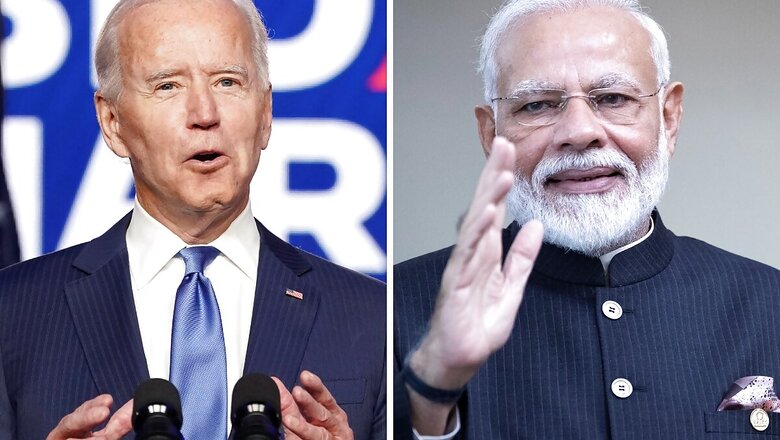
views
So Prime Minister Narendra Modi and US President Joe Biden finally had their first telephonic interaction after the US President’s inauguration, late Monday night. The readouts shared by both the State Department and the MEA point to the topics touched upon. Both the statements refer to two very important issues which figured prominently in the talks; climate change and a free and open Indo-Pacific.
Climate change is a cornerstone for the Biden administration. The importance of the issue can be gauged by the fact that President Biden has appointed a new special climate envoy, someone no less than former Secretary of State John Kerry. Rejoining the Paris climate accord was also one of the first decisions taken by the new President.
Prime Minister Modi has also spoken on numerous occasions about the importance of mitigating climate change for India. His government has made a massive push for 100 GW of renewable power by 2030. India is one of the few developing countries that is committed to playing its role in mitigating climate change. Modi’s government would do well in appointing a special climate envoy to engage with Secretary Kerry, much like the Chinese have done.
China has brought back veteran climate negotiator Xie Zhenhua who has had a track record of interacting with John Kerry back as the Chinese government’s climate envoy. India too should think on similar lines. After all, a country with 700 million young people owes it most to them to ensure that we leave behind a reasonably inhabitable planet for our future generations.
The other important issue which finds mention in both readouts is that of a free and open Indo-Pacific. This is a very important issue both to India and to traditional American allies like Japan, South Korea, Philippines, Vietnam and Indonesia, all of whom have been rubbed the wrong way by China in recent territorial disputes.
India would be hoping that the new Biden administration will bring pressure to bear on the Chinese to ease up on the LAC. But it is clear from Secretary of State Antony Blinken’s comments that while the Trump approach may have been correct in principle, the method was all wrong. Thanks to Trump, no future US administration will be able to deal with China in a business as usual way. It is clear that the US-China relationship in the 21st century is going to be similar to the US-Soviet Union relationship through much of the 20th century. Many foreign policy commentators like Gideon Rachman are calling this the new Cold War.
The statement also lays emphasis on democratic institutions and values which is a bedrock for the US-India relationship. In normal course of things, this would have been seen as standard fare as lofty words about democracy and shared values have always found mention in Indo-US joint statements. But this time it could be different, given how the US administration has already commented on the farmers’ protests. While welcoming the new laws, the State Department in its statement last week had also opined on the internet outage in the venues of the farmer protests. While there won’t be any tweets or public comments by any of the administration officials on New Delhi to reconcile with the farmers, I’m sure behind the scenes this will be a topic of much discussion.
One other area which could become a bugbear is Kashmir. New Delhi is clear there’s no going back on the abrogation of Article 370. But the recent conciliatory comments by Pak Army Chief General Bajwa and later by Pak PM Imran Khan cannot be seen in isolation. Clearly there is some smoke behind the fire. Foreign policy watchers will be keenly following developments on the Indo-Pak front in the days to come. One cannot rule out a quid pro quo, concessions along the LoC for some easing up along the LAC. Watch this space.
Read all the Latest News, Breaking News and Coronavirus News here




















Comments
0 comment